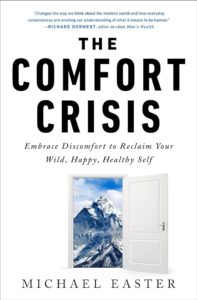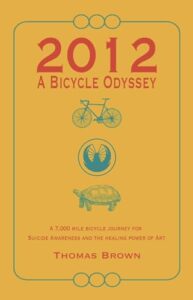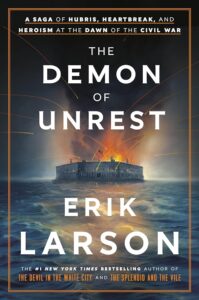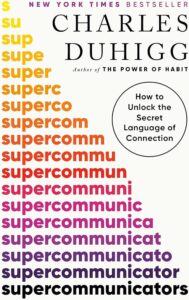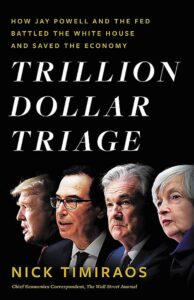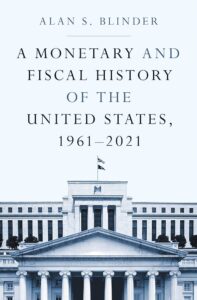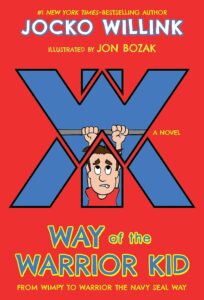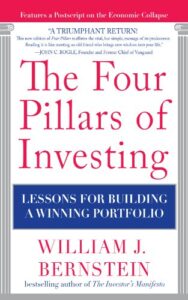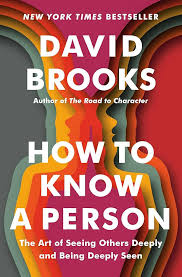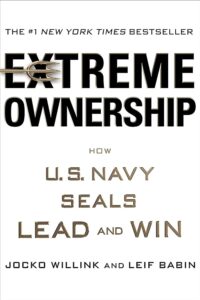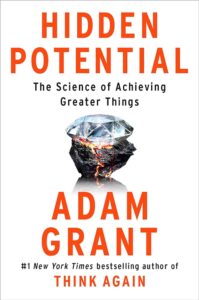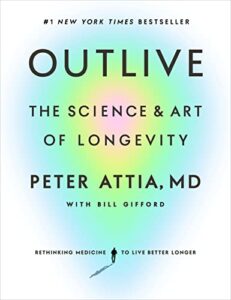From Finance to Fiction: TCI’s Summer Book Recommendations
Summer 2024 is officially here. Time for family vacation, staying cool by the lake, and looking forward to monsoon season. Summer brings a great energy that is unique from the rest of the year. The kids are excited to be out of school and spread that positive sort of kinetic energy everywhere they go. So many daily adventures. There is also a little easing to the daily grind as things tend to slow down while people travel and get away, and with that comes a sense of welcome calm and relaxation. Yes, summer is a great time of year – nothing better than spending this time with family, friends, and books.
Books are special to me, and I believe that reading is good for the soul. I’ve been reading my entire life, and I have my dad and my sister to thank for that. My dad taught me how to love to read, and my sister gave me stories that I consider to this day to have shaped who I am and how I see the world. Each book that I read has an intangible value, and I keep every single one. Besides my family, my treasure is my ever-growing collection of books. I plan on passing that treasure on to my son and daughter one day.
The majority of the books that I read are non-fiction. I enjoy the knowledge and history and gaining a deeper understanding of many different subjects that I set out to study. Of course, a good fiction is a wonderful way to take a break, but I very much enjoy being a life-long learner.
In the past I’ve highlighted mostly books on finance, business, and the economy (past summer reading recommendations from 2020, 2021, 2022, and 2023). There are a few of those that made the list this year, but there are just so many other important topics out there that are good for us to study. Wealth means nothing if we are also not healthy in mind, body, and soul. So 2024’s summer reading list includes books on mindfulness, health and longevity, history, economics, and even a great read for kids.
I would like to especially highlight The Comfort Crisis, which I wrote about in a recent article and TCI’s spring 2024 FOCUS newsletter, reflecting on the journey of training for my first full marathon that I ran in February. I promise that this book will make you grow as a person. If you read one book on this list, read The Comfort Crisis. There is, however, something to learn from each one of these special books, and I encourage you to check them out.
Before you get started, I’d like to point out two things: First, the summaries here are not my own. They are taken from either the book itself, the publisher, or the distributor. Second, I like all of the books on this list, they are all great reads, but that doesn’t mean that I — or TCI, for that matter — endorse everything that is written in the pages.
I hope you enjoy.
“A capacity, and taste, for reading gives access to whatever has already been discovered by others.”
—Abraham Lincoln
The Comfort Crisis: Embrace Discomfort to Reclaim Your Wild, Happy, and Healthy Self
By Michael Easter
“Discover the evolutionary mind and body benefits of living at the edges of your comfort zone and reconnecting with the wild.
In many ways, we’re more comfortable than ever before. But could our sheltered, temperature-controlled, overfed, underchallenged lives actually be the leading cause of many our most urgent physical and mental health issues? In this gripping investigation, award-winning journalist Michael Easter seeks out off-the-grid visionaries, disruptive genius researchers, and mind-body conditioning trailblazers who are unlocking the life-enhancing secrets of a counterintuitive solution: discomfort.
Easter’s journey to understand our evolutionary need to be challenged takes him to meet the NBA’s top exercise scientist, who uses an ancient Japanese practice to build championship athletes; to the mystical country of Bhutan, where an Oxford economist and Buddhist leader are showing the world what death can teach us about happiness; to the outdoor lab of a young neuroscientist who’s found that nature tests our physical and mental endurance in ways that expand creativity while taming burnout and anxiety; to the remote Alaskan backcountry on a demanding 33-day hunting expedition to experience the rewilding secrets of one of the last rugged places on Earth; and more.
Along the way, Easter uncovers a blueprint for leveraging the power of discomfort that will dramatically improve our health and happiness, and perhaps even help us understand what it means to be human. The Comfort Crisis is a bold call to break out of your comfort zone and explore the wild within yourself.”
2012 A Bicycle Odyssey: A 7,000 Mile Bicycle Journey for Suicide Awareness and the Healing Power of Art
By Thomas Brown
“In the late summer of 2001, Thomas Brown lost his brother, Marc Brown, to suicide. After a turbulent decade of navigating the grief of his brother’s loss, a series of synchronistic events set him on a quest to organize and ride his bicycle over 7,000 miles, zig-zagging across the United States. Together with a friend, Zak, who also lost a brother to suicide, Thomas sets out on an adventure that would test his body, his spirit, and his mind. Along his path, Thomas meets an extraordinary cast of characters and receives many lessons, but above all, he learns the value of self-awareness. 2012: A Bicycle Odyssey shares the exploits of organizing a cross-country adventure, embarking on the wild journey, and finding one’s way back home.”
The Demon of Unrest: A Saga of Hubris, Heartbreak, and Heroism at the Dawn of the Civil War
By Erik Larson
“On November 6, 1860, Abraham Lincoln became the fluky victor in a tight race for president. The country was bitterly at odds; Southern extremists were moving ever closer to destroying the Union, with one state after another seceding and Lincoln powerless to stop them. Slavery fueled the conflict, but somehow the passions of North and South came to focus on a lonely federal fortress in Charleston Harbor: Fort Sumter.
Master storyteller Erik Larson offers a gripping account of the chaotic months between Lincoln’s election and the Confederacy’s shelling of Sumter—a period marked by tragic errors and miscommunications, enflamed egos and craven ambitions, personal tragedies and betrayals. Lincoln himself wrote that the trials of these five months were “so great that, could I have anticipated them, I would not have believed it possible to survive them.”
At the heart of this suspense-filled narrative are Major Robert Anderson, Sumter’s commander and a former slave owner sympathetic to the South but loyal to the Union; Edmund Ruffin, a vain and bloodthirsty radical who stirs secessionist ardor at every opportunity; and Mary Boykin Chesnut, wife of a prominent planter, conflicted over both marriage and slavery and seeing parallels between them. In the middle of it all is the overwhelmed Lincoln, battling with his duplicitous secretary of state, William Seward, as he tries desperately to avert a war that he fears is inevitable—one that will eventually kill 750,000 Americans.
Drawing on diaries, secret communiques, slave ledgers, and plantation records, Larson gives us a political horror story that captures the forces that led America to the brink—a dark reminder that we often don’t see a cataclysm coming until it’s too late.”
Supercommunicators: How to Unlock the Secret Language of Connection
By Charles Duhigg
“Come inside a jury room as one juror leads a starkly divided room to consensus. Join a young CIA officer as he recruits a reluctant foreign agent. And sit with an accomplished surgeon as he tries, and fails, to convince yet another cancer patient to opt for the less risky course of treatment. In Supercommunicators, Charles Duhigg blends deep research and his trademark storytelling skills to show how we can all learn to identify and leverage the hidden layers that lurk beneath every conversation.
Communication is a superpower and the best communicators understand that whenever we speak, we’re actually participating in one of three conversations: practical (What’s this really about?), emotional (How do we feel?), and social (Who are we?). If you don’t know what kind of conversation you’re having, you’re unlikely to connect.
Supercommunicators know the importance of recognizing—and then matching—each kind of conversation, and how to hear the complex emotions, subtle negotiations, and deeply held beliefs that color so much of what we say and how we listen. Our experiences, our values, our emotional lives—and how we see ourselves, and others—shape every discussion, from who will pick up the kids to how we want to be treated at work. In this book, you will learn why some people are able to make themselves heard, and to hear others, so clearly.
With his storytelling that takes us from the writers’ room of The Big Bang Theory to the couches of leading marriage counselors, Duhigg shows readers how to recognize these three conversations—and teaches us the tips and skills we need to navigate them more successfully.”
Trillion Dollar Triage: How Jay Powell and the Fed Battled the White House and Saved the Economy
By Nick Timiraos
“By February 2020, the U.S. economic expansion had become the longest on record. Unemployment was plumbing half-century lows. Stock markets soared to new highs. One month later, the public health battle against a deadly virus had pushed the economy into the equivalent of a medically induced coma. America’s workplaces—offices, shops, malls, and factories—shuttered. Many of the nation’s largest employers and tens of thousands of small businesses faced ruin. Over 22 million American jobs were lost. The extreme uncertainty led to some of the largest daily drops ever in the stock market.
Nick Timiraos, the Wall Street Journal’s chief economics correspondent, draws on extensive interviews to detail the tense meetings, late night phone calls, and crucial video conferences behind the largest, swiftest U.S. economic policy response since World War II. Trillion Dollar Triage goes inside the Federal Reserve, one of the country’s most important and least understood institutions, to chronicle how its plainspoken chairman, Jay Powell, unleashed an unprecedented monetary barrage to keep the economy on life support. With the bleeding stemmed, the Fed faced a new challenge: How to nurture a recovery without unleashing an inflation-fueling, bubble-blowing money bomb?
Trillion Dollar Triage is the definitive, gripping history of a creative and unprecedented battle to shield the American economy from the twin threats of a public health disaster and economic crisis. Economic theory and policy will never be the same.”
A Monetary and Fiscal History of the United States, 1961-2021
By Alan S. Blinder
“In this book, Alan Blinder, one of the world’s most influential economists and one of the field’s best writers, draws on his deep firsthand experience to provide an authoritative account of sixty years of monetary and fiscal policy in the United States. Spanning twelve presidents, from John F. Kennedy to Joe Biden, and eight Federal Reserve chairs, from William McChesney Martin to Jerome Powell, this is an insider’s story of macroeconomic policy that hasn’t been told before―one that is a pleasure to read, and as interesting as it is important.
Focusing on the most significant developments and long-term changes, Blinder traces the highs and lows of monetary and fiscal policy, which have by turns cooperated and clashed through many recessions and several long booms over the past six decades. From the fiscal policy of Kennedy’s New Frontier to Biden’s responses to the pandemic, the book takes readers through the stagflation of the 1970s, the conquest of inflation under Jimmy Carter and Paul Volcker, the rise of Reaganomics, and the bubbles of the 2000s before bringing the story up through recent events―including the financial crisis, the Great Recession, and monetary policy during COVID-19.
A lively and concise narrative that is sure to become a classic, A Monetary and Fiscal History of the United States, 1961–2021 is filled with vital lessons for anyone who wants to better understand where the economy has been―and where it might be headed.”
Way of the Warrior Kid: From Wimpy to Warrior the Navy SEAL Way
By Jocko Willink
“Fifth grade was the worst year of Marc’s life. He stunk at gym class, math was too hard for him, the school lunch was horrible, and his class field trip was ruined because he couldn’t swim. But what was most awful thing about fifth grade? Kenny Williamson, the class bully, who calls himself the “King of the Jungle.”
When Marc’s mother tells him that his Uncle Jake is coming to stay for the whole summer, Marc can’t wait. Uncle Jake is a for real, super-cool Navy SEAL. And Uncle Jake has a plan.
He’s going to turn Marc into a warrior.
Becoming a warrior isn’t easy. It means a lot of pull ups, sit ups, pushups, squats, swimming, eating right, and studying harder than ever before! Can Marc transform himself into a warrior before school starts in the fall – and finally stand up to the King of the Jungle himself?”
The Four Pillars of Investing: Lessons for Building a Winning Portfolio
By William J. Bernstein
“The classic guide to constructing a solid portfolio—with out a financial advisor! “With relatively little effort, you can design and assemble an investment portfolio that, because of its wide diversification and minimal expenses, will prove superior to the most professionally managed accounts. Great intelligence and good luck are not required.“ William Bernstein‘s commonsense approach to portfolio construction has served investors well during the past turbulent decade—and it‘s what made The Four Pillars of Investing an instant classic when it was first published nearly a decade ago. This down-to-earth book lays out in easy-to-understand prose the four essential topics that every investor must master: the relationship of risk and reward, the history of the market, the psychology of the investor and the market, and the folly of taking financial advice from investment salespeople. Bernstein pulls back the curtain to reveal what really goes on in today‘s financial industry as he outlines a simple program for building wealth while controlling risk. Straightforward in its presentation and generous in its real-life examples, The Four Pillars of Investing presents a no-nonsense discussion of: The art and science of mixing different asset classes into an effective blend The dangers of actively picking stocks, as opposed to investing in the whole market Behavioral finance and how state of mind can adversely affect decision making Reasons the mutual fund and brokerage industries, rather than your partners, are often your most direct competitors Strategies for managing all of your assets—savings, 401(k)s, home equity—as one portfolio Investing is not a destination. It is a journey, and along the way are stockbrokers, journalists, and mutual fund companies whose interests are diametrically opposed to yours. More relevant today than ever, The Four Pillars of Investing shows you how to determine your own financial direction and assemble an investment program with the sole goal of building long-term wealth for you and your family.”
How to Know A Person: The Art of Seeing Others Deeply and Being Deeply Seen
By David Brooks
“As David Brooks observes, “There is one skill that lies at the heart of any healthy person, family, school, community organization, or society: the ability to see someone else deeply and make them feel seen—to accurately know another person, to let them feel valued, heard, and understood.”
And yet we humans don’t do this well. All around us are people who feel invisible, unseen, misunderstood. In How to Know a Person, Brooks sets out to help us do better, posing questions that are essential for all of us: If you want to know a person, what kind of attention should you cast on them? What kind of conversations should you have? What parts of a person’s story should you pay attention to?
Driven by his trademark sense of curiosity and his determination to grow as a person, Brooks draws from the fields of psychology and neuroscience and from the worlds of theater, philosophy, history, and education to present a welcoming, hopeful, integrated approach to human connection. How to Know a Person helps readers become more understanding and considerate toward others, and to find the joy that comes from being seen. Along the way it offers a possible remedy for a society that is riven by fragmentation, hostility, and misperception.
The act of seeing another person, Brooks argues, is profoundly creative: How can we look somebody in the eye and see something large in them, and in turn, see something larger in ourselves? How to Know a Person is for anyone searching for connection, and yearning to be understood.”
Extreme Ownership: How U.S. Navy SEALs Lead and Win
By Jocko Willink and Leif Babin
“Sent to the most violent battlefield in Iraq, Jocko Willink and Leif Babin’s SEAL task unit faced a seemingly impossible mission: help U.S. forces secure Ramadi, a city deemed “all but lost.” In gripping firsthand accounts of heroism, tragic loss, and hard-won victories in SEAL Team Three’s Task Unit Bruiser, they learned that leadership―at every level―is the most important factor in whether a team succeeds or fails.Willink and Babin returned home from deployment and instituted SEAL leadership training that helped forge the next generation of SEAL leaders. After departing the SEAL Teams, they launched Echelon Front, a company that teaches these same leadership principles to businesses and organizations. From promising startups to Fortune 500 companies, Babin and Willink have helped scores of clients across a broad range of industries build their own high-performance teams and dominate their battlefields.
Now, detailing the mind-set and principles that enable SEAL units to accomplish the most difficult missions in combat, Extreme Ownership shows how to apply them to any team, family or organization. Each chapter focuses on a specific topic such as Cover and Move, Decentralized Command, and Leading Up the Chain, explaining what they are, why they are important, and how to implement them in any leadership environment.
A compelling narrative with powerful instruction and direct application, Extreme Ownership revolutionizes business management and challenges leaders everywhere to fulfill their ultimate purpose: lead and win.”
Hidden Potential: The Science of Achieving Greater Things
By Adam Grant
“We live in a world that’s obsessed with talent. We celebrate gifted students in school, natural athletes in sports, and child prodigies in music. But admiring people who start out with innate advantages leads us to overlook the distance we ourselves can travel. We underestimate the range of skills that we can learn and how good we can become. We can all improve at improving. And when opportunity doesn’t knock, there are ways to build a door.
Hidden Potential offers a new framework for raising aspirations and exceeding expectations. Adam Grant weaves together groundbreaking evidence, surprising insights, and vivid storytelling that takes us from the classroom to the boardroom, the playground to the Olympics, and underground to outer space. He shows that progress depends less on how hard you work than how well you learn. Growth is not about the genius you possess—it’s about the character you develop. Grant explores how to build the character skills and motivational structures to realize our own potential, and how to design systems that create opportunities for those who have been underrated and overlooked.
Many writers have chronicled the habits of superstars who accomplish great things. This book reveals how anyone can rise to achieve greater things. The true measure of your potential is not the height of the peak you’ve reached, but how far you’ve climbed to get there.”
Outlive: The Science and Art of Longevity
By Peter Attia, M.D. with Bill Gifford
Wouldn’t you like to live longer? And better? In this operating manual for longevity, Dr. Peter Attia draws on the latest science to deliver innovative nutritional interventions, techniques for optimizing exercise and sleep, and tools for addressing emotional and mental health.
For all its successes, mainstream medicine has failed to make much progress against the diseases of aging that kill most people: heart disease, cancer, Alzheimer’s disease, and type 2 diabetes. Too often, it intervenes with treatments too late to help, prolonging lifespan at the expense of health span, or quality of life. Dr. Attia believes we must replace this outdated framework with a personalized, proactive strategy for longevity, one where we take action now, rather than waiting.
This is not “biohacking,” it’s science: a well-founded strategic and tactical approach to extending lifespan while also improving our physical, cognitive, and emotional health. Dr. Attia’s aim is less to tell you what to do and more to help you learn how to think about long-term health, in order to create the best plan for you as an individual. In Outlive, readers will discover:
- Why the cholesterol test at your annual physical doesn’t tell you enough about your actual risk of dying from a heart attack.
- That you may already suffer from an extremely common yet underdiagnosed liver condition that could be a precursor to the chronic diseases of aging.
- Why exercise is the most potent pro-longevity “drug”—and how to begin training for the “Centenarian Decathlon.”
- Why you should forget about diets, and focus instead on nutritional biochemistry, using technology and data to personalize your eating pattern.
- Why striving for physical health and longevity, but ignoring emotional health, could be the ultimate curse of all.
Aging and longevity are far more malleable than we think; our fate is not set in stone. With the right roadmap, you can plot a different path for your life, one that lets you outlive your genes to make each decade better than the one before.

